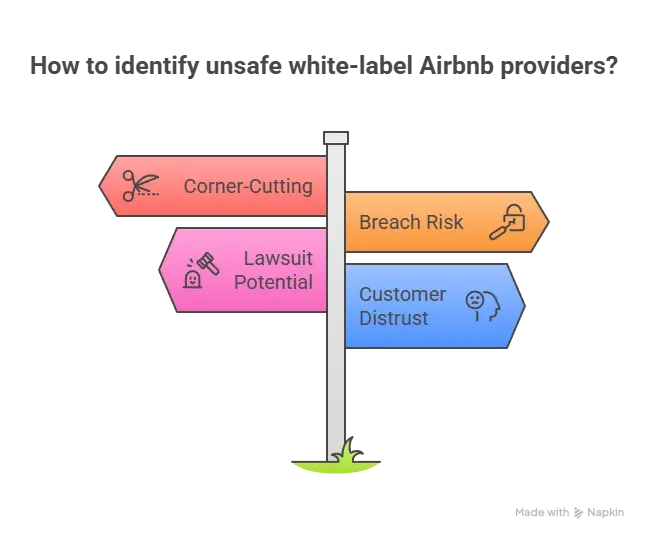You’ve heard the horror stories about data breaches, stolen payment details, and hacked accounts shaking the travel and hospitality industry. With millions of travelers relying on platforms like Airbnb, the stakes couldn’t be higher. Now, as white-label Airbnb solutions become increasingly popular, entrepreneurs and businesses face the pressing question: Are these platforms truly safe?
In 2025, safety is no longer just a “nice-to-have” — it’s the foundation of trust in every digital interaction. Hosts entrust their property information, guests share sensitive identification and payment data, and platforms handle transactions worth billions. A single vulnerability an result in massive financial losses, reputational damage, and regulatory penalties.
This guide delivers an honest assessment of white-label Airbnb security. We’ll explore the risks, industry standards, and compliance requirements — and most importantly, show you practical ways to secure your platform.
At Miracuves, we don’t just build apps — we engineer security-first solutions that give businesses the confidence to scale without compromise.

Understanding White-Label Airbnb Security Landscape
What “White-Label Security” Actually Means
When you choose a white-label Airbnb platform, you’re essentially licensing a pre-built framework that can be rebranded and customized. The security of such platforms depends heavily on the core architecture, compliance practices, and ongoing updates provided by the vendor. Unlike custom-built apps, where security is developed from scratch, white-label apps rely on a balance of shared security responsibility between provider and business owner.
Common Security Myths vs. Reality
- Myth: White-label apps are inherently less secure than custom apps.
Reality: Security depends on development standards, audits, and maintenance — not the label “white-label.” A certified provider can be more secure than a poorly built custom app. - Myth: If the app looks polished, it must be safe.
Reality: A sleek UI doesn’t guarantee encrypted data, secure APIs, or compliance with global laws. - Myth: Security is a one-time setup.
Reality: Cyber threats evolve daily. Security is a continuous process involving updates, monitoring, and compliance.
Why People Worry About White-Label Apps flag
- Unknown Code Origins – Fear of outdated or reused codebases with hidden vulnerabilities.
- Compliance Gaps – Concerns about GDPR, CCPA, or PCI DSS compliance in global operations.
- Data Misuse – Sensitive user info like IDs, addresses, and payment details are prime hacker targets.
- Lack of Transparency – Some providers don’t openly share their security policies or audit results.
Current Threat Landscape for Airbnb-Type Platforms (2025)
- Account Takeovers (ATO): Hackers exploiting weak authentication systems.
- Payment Fraud: Stolen credit card data and fake bookings.
- Data Breaches: Exposed user PII (personally identifiable information).
- Fake Listings & Scams: Exploiting loopholes in platform verification.
- API Exploits: Poorly secured integrations leading to data leaks.
Security Standards in 2025
- ISO 27001 & SOC 2 Type II are baseline requirements.
- End-to-End Encryption for all communication and transactions.
- 2FA / Multi-Factor Authentication as default.
- GDPR/CCPA Compliance is mandatory for global platforms.
- Regular Penetration Testing is expected every quarter.
Real-World Statistics (2025 Snapshot)
- Travel industry reported a 23% rise in cyberattacks compared to 2023.
- 72% of breaches in hospitality apps were due to poor authentication systems.
- Global regulatory fines for non-compliance with GDPR/CCPA exceeded $2.1 billion in 2024 alone.
- Average cost of a single data breach in hospitality: $3.2 million (IBM 2024 Report).
Read more: – What is Airbnb App and How Does It Work?
Key Security Risks & How to Identify Them
White-label Airbnb apps can unlock tremendous opportunities — but they also introduce unique security risks that must be identified early. Let’s break down the high-risk areas that every operator should monitor.
Data Protection & Privacy Risks
- User Personal Information: Guests share government IDs, phone numbers, and addresses. If not encrypted, this becomes a goldmine for hackers.
- Payment Data Security: Credit card leaks or insecure payment gateways can result in financial fraud.
- Location Tracking Concerns: Real-time guest/host location data must be handled carefully to avoid stalking or criminal misuse.
- GDPR/CCPA Compliance: Non-compliance can lead to lawsuits and multi-million-dollar fines.
Technical Vulnerabilities
- Code Quality Issues: Reused or poorly reviewed code may contain backdoors.
- Server Security Gaps: Inadequately secured hosting environments can be exploited.
- API Vulnerabilities: Integration with payment processors, maps, and messaging can expose data if not secured.
- Third-Party Integrations: Plugins and add-ons often introduce vulnerabilities outside the vendor’s control.
Business Risks
- Legal Liability: A single data breach can expose your company to lawsuits from guests, hosts, and regulators.
- Reputation Damage: Trust is the lifeblood of hospitality. One security failure can cause irreversible brand harm.
- Financial Losses: Fraudulent bookings, chargebacks, and penalties can wipe out profits.
- Regulatory Penalties: Non-compliance with GDPR, PCI DSS, or local laws leads to severe fines.
Risk Assessment Checklist
Before launching your white-label Airbnb, ask:
- Is all sensitive data (PII, payment info) encrypted at rest and in transit?
- Has the provider conducted independent security audits?
- Are APIs penetration-tested regularly?
- Does the app comply with GDPR/CCPA/PCI DSS requirements?
- Is there a defined incident response plan?
- Are backup and disaster recovery systems in place?
- How often are security patches and updates applied?
If you can’t check all the boxes, your platform is at significant risk.
Read more : –What is Zillow App and How Does It Work?
Security Standards Your White-Label Airbnb Must Meet
To operate a safe and trustworthy white-label Airbnb in 2025, you need more than promises — you need verified security standards. These are the certifications, technical safeguards, and practices that separate a secure platform from a risky one.
Essential Certifications
- ISO 27001 Compliance – International standard for information security management systems. Ensures processes are in place for data protection.
- SOC 2 Type II – Demonstrates the provider maintains strict controls for security, availability, and confidentiality.
- GDPR Compliance – Mandatory for handling EU citizens’ data. Covers consent, storage, and user rights.
- HIPAA Compliance (if applicable) – Required if your platform expands to medical-related stays (e.g., healthcare housing).
- PCI DSS Certification – Required for handling credit card payments securely.
Technical Requirements
- End-to-End Encryption – All user data, from chats to bookings, must be encrypted during transmission and storage.
- Secure Authentication – Two-Factor Authentication (2FA) or OAuth to prevent account takeovers.
- Regular Security Audits – Independent audits at least annually, preferably quarterly.
- Penetration Testing – Simulated cyberattacks to identify and fix vulnerabilities.
- SSL Certificates – Ensures secure communication between users and servers.
- Secure API Design – Strong authentication, rate limiting, and encrypted connections for all APIs.
Security Standards Comparison Table
| Security Standard | Why It Matters | Mandatory/Recommended |
|---|---|---|
| ISO 27001 | Global benchmark for information security | Recommended |
| SOC 2 Type II | Proves operational security controls | Recommended |
| GDPR | Required for EU user data | Mandatory |
| CCPA | Required for California users | Mandatory |
| HIPAA | For healthcare-related use cases | Conditional |
| PCI DSS | Protects payment data & transactions | Mandatory |
| End-to-End Encryption | Safeguards sensitive data exchanges | Mandatory |
| 2FA / OAuth | Prevents unauthorized access | Mandatory |
Red flag: How to Spot Unsafe White-Label Providers
Not all white-label Airbnb providers are created equal. Some cut corners, leaving your business vulnerable to breaches, lawsuits, and customer distrust. Here are the warning signs you should never ignore.

Warning Signs of Unsafe Providers
- No Security Documentation – If they can’t provide security architecture diagrams, audit reports, or compliance proof, it’s a red flag.
- Cheap Pricing Without Explanation – Extremely low-cost solutions often mean outdated code, poor testing, or zero security investment.
- No Compliance Certifications – Lack of GDPR, PCI DSS, or ISO 27001 means they aren’t meeting industry standards.
- Outdated Technology Stack – Legacy code, unpatched frameworks, or unsupported libraries expose you to exploits.
- Poor Code Quality – No version control, no peer reviews, or spaghetti codebases signal high vulnerability risk.
- No Security Updates Policy – If updates aren’t regular and documented, your app will quickly become a hacker’s playground.
- Lack of Data Backup Systems – No disaster recovery or backup plans mean you could lose everything in a single incident.
- No Insurance Coverage – Without liability insurance, you bear 100% of the financial risk of a breach.
Evaluation Checklist for Choosing a Provider
When evaluating a white-label Airbnb vendor, ask these critical questions:
- Security Policies: Do they have written security protocols and data handling policies?
- Certifications: Can they provide ISO 27001, SOC 2, PCI DSS, or GDPR compliance proof?
- Audit Reports: Have they undergone third-party penetration testing or audits in the last 12 months?
- Update Frequency: How often do they push security updates and patches?
- Data Storage: Where is data hosted, and is it encrypted at rest and in transit?
- Insurance: Do they offer coverage for potential breaches or service downtime?
- Incident Response: What’s their timeline for addressing a breach or vulnerability?
- Documentation: Will they provide full technical and security documentation on request?
By following this checklist, you can separate security-first providers from risky shortcuts.
Best Practices for Secure White-Label Airbnb Implementation
Building and launching a white-label Airbnb isn’t just about features and branding — it’s about baking in security from day one. Here’s how to ensure your platform stays safe at every stage.
Pre-Launch Security Measures
- Security Audit Process – Conduct third-party audits before launch to identify hidden vulnerabilities.
- Code Review Requirements – Enforce peer-reviewed coding practices and static code analysis for quality assurance.
- Infrastructure Hardening – Secure cloud servers with firewalls, DDoS protection, and role-based access controls.
- Compliance Verification – Validate GDPR, CCPA, PCI DSS, and other applicable standards before going live.
- Staff Training Programs – Train your internal team on secure coding, data handling, and incident response.
Post-Launch Security Monitoring
- Continuous Security Monitoring – Use automated tools to detect suspicious activity, malware injections, or data leaks.
- Regular Updates & Patches – Apply critical updates promptly to block zero-day vulnerabilities.
- Incident Response Planning – Maintain a documented plan outlining who acts, how fast, and what steps to take after a breach.
- User Data Management – Encrypt user information, anonymize sensitive logs, and enforce strict access controls.
- Backup & Recovery Systems – Ensure regular encrypted backups with fast recovery capabilities in case of data loss or cyberattacks.
Security Implementation Timeline
| Stage | Key Security Actions | Outcome |
|---|---|---|
| Pre-Launch (0-3 mo) | Code reviews, audits, compliance checks, infrastructure hardening | Secure foundation |
| Launch (3-6 mo) | Final penetration testing, monitoring setup, staff training | Safe go-live |
| Post-Launch (6-12 mo) | Continuous monitoring, patching, incident response drills | Ongoing protection |
| Ongoing (Yearly) | Annual compliance audits, re-certifications, penetration tests | Long-term trust |
Legal & Compliance Considerations
Security isn’t just about technology — it’s also about legal and regulatory obligations. A white-label Airbnb must comply with global data protection laws, industry-specific regulations, and liability protections to operate safely and avoid costly penalties.
Regulatory Requirements
- Data Protection Laws by Region
- GDPR (Europe): Requires explicit user consent, data portability, and breach notifications within 72 hours.
- CCPA (California): Grants users the right to know, delete, and opt-out of data collection.
- PIPEDA (Canada): Mandates user consent and breach reporting for personal information.
- PDPA (Singapore, India’s DPDP Act 2023, etc.): Region-specific privacy laws are tightening worldwide.
- Industry-Specific Regulations
- PCI DSS: For handling credit card transactions.
- HIPAA (U.S.): Required if hosting involves medical travel or healthcare stays.
- Local Hospitality Laws: Vary by country/city (e.g., guest registration requirements).
- User Consent Management
- Transparent privacy policies.
- Easy opt-in/opt-out for data collection.
- Granular cookie and tracking settings.
- Privacy Policy Requirements
- Must outline data collection, usage, storage, and sharing.
- Should be accessible in plain language, not just legal jargon.
- Terms of Service Essentials
- Liability disclaimers.
- User responsibilities (e.g., accurate information, lawful use).
- Security incident protocols.
Liability Protection
- Insurance Requirements – Cyber liability insurance to cover breaches, downtime, and regulatory penalties.
- Legal Disclaimers – Clearly outline limitations of liability in contracts and terms.
- User Agreements – Ensure users acknowledge and agree to data processing, payments, and risks.
- Incident Reporting Protocols – Define how incidents are reported to users, regulators, and affected stakeholders.
- Regulatory Compliance Monitoring – Ongoing legal reviews to adapt to changing laws.
Compliance Requirements by Region
| Region | Key Requirement | Mandatory? |
|---|---|---|
| EU (GDPR) | User consent, data portability, breach reporting | Yes |
| US (CCPA, PCI DSS, HIPAA) | Consumer data rights, secure payments, healthcare compliance (if applicable) | Yes |
| Canada (PIPEDA) | Consent & breach disclosure | Yes |
| Asia (PDPA, DPDP Act) | Consent & regional data hosting rules | Yes |
| Global | PCI DSS for payments, SSL/TLS encryption, ISO 27001 recommended | Yes |
Why Miracuves White-Label Airbnb is Your Safest Choice
When it comes to running a platform as sensitive as a white-label Airbnb, choosing the right provider can mean the difference between trust and disaster. At Miracuves, we’ve built our reputation on delivering enterprise-grade security that protects your users, your business, and your brand.
Miracuves Security Advantages
- Enterprise-Grade Security Architecture – Built with layered defenses including firewalls, intrusion detection, and encryption-by-default.
- Regular Security Audits & Certifications – Independent third-party penetration tests and compliance reviews ensure your platform meets global standards.
- GDPR/CCPA Compliant by Default – Privacy-first design that makes compliance seamless, not stressful.
- 24/7 Security Monitoring – Real-time threat detection and response to stop attacks before they escalate.
- Encrypted Data Transmission – All sensitive information is encrypted at rest and in transit using AES-256 and TLS 1.3.
- Secure Payment Processing – PCI DSS–compliant gateways with fraud detection systems built-in.
- Regular Security Updates – Continuous patching and updates to keep your app ahead of evolving cyber threats.
- Insurance Coverage Included – Liability protection that reduces business risk in case of security incidents.
Why Businesses Trust Miracuves
With over 600+ successful projects delivered, Miracuves has maintained a record of zero major security breaches. Our approach combines technical rigor, compliance expertise, and proactive monitoring to give you confidence at scale.
Don’t compromise on security. Miracuves white-label Airbnb solutions come with enterprise-grade protection built-in. From encryption to compliance, we handle the security so you can focus on growth.
Get a free security assessment today and see why global businesses choose Miracuves as their trusted partner for safe, compliant, and scalable platforms.
Final Thought
In today’s digital economy, trust is the currency that drives success. For a white-label Airbnb, security isn’t just about protecting data — it’s about safeguarding experiences, reputations, and livelihoods. Guests need confidence that their personal and payment details are safe. Hosts need assurance that their properties and identities won’t be exploited. And businesses need to know their platforms won’t collapse under legal, financial, or reputational risks.
The truth is clear: security can’t be an afterthought. It must be designed into the foundation of your platform, continuously updated, and rigorously audited. In 2025, with cyberattacks growing more sophisticated and regulations becoming stricter, only providers who treat security as a non-negotiable standard will thrive.
At Miracuves, we believe in building more than apps — we build secure ecosystems that help businesses scale responsibly. If you’re planning to launch or upgrade your white-label Airbnb, don’t just ask what it can do — ask how well it protects the people who trust it.
Because in the world of digital hospitality, safety isn’t optional — it’s everything.
FAQs:
How secure is white-label vs custom development?
White-label apps can be just as secure — or even more secure — than custom builds, provided the provider follows ISO 27001, SOC 2, and PCI DSS standards with ongoing audits and updates.
What happens if there’s a security breach?
A good provider should have an incident response plan, breach notification process, and insurance. Miracuves provides 24/7 monitoring and rapid response.
Who is responsible for security updates?
Security updates are shared: providers patch the codebase, while businesses manage hosting, integrations, and user practices.
How is user data protected in white-label apps?
User data is protected with AES-256 encryption, TLS 1.3 secure transmission, RBAC, and anonymized logs.
What compliance certifications should I look for?
ISO 27001, SOC 2 Type II, PCI DSS, GDPR, and CCPA are the key certifications.
Can white-label apps meet enterprise security standards?
Yes, with end-to-end encryption, secure APIs, penetration testing, and compliance certifications. Miracuves platforms meet enterprise standards by default.
How often should security audits be conducted?
At least once a year, with quarterly penetration testing recommended for high-risk apps.
What’s included in Miracuves’ security package?
Penetration testing, GDPR/CCPA compliance, 24/7 monitoring, encrypted payments, insurance, and continuous updates.
How to handle security in different countries
By complying with regional laws such as GDPR, CCPA, DPDP, and PDPA, with multi-jurisdiction compliance built in.
What insurance is needed for app security
Cyber liability insurance, errors & omissions insurance, and business interruption coverage.








